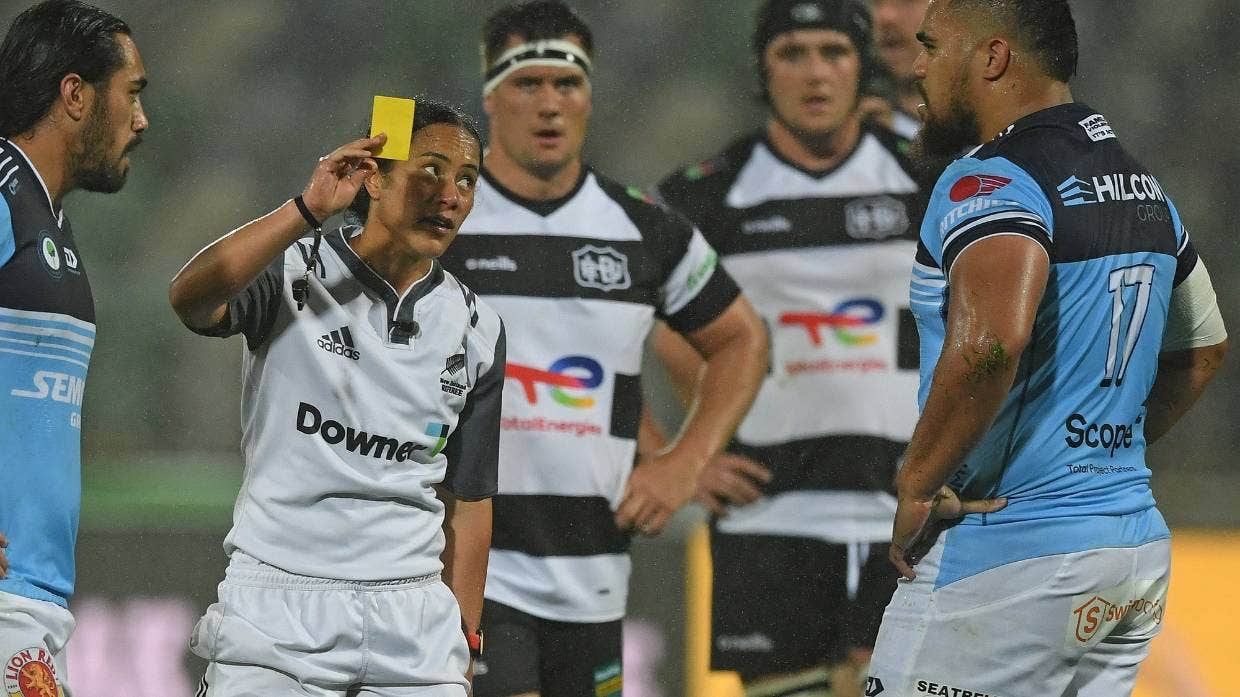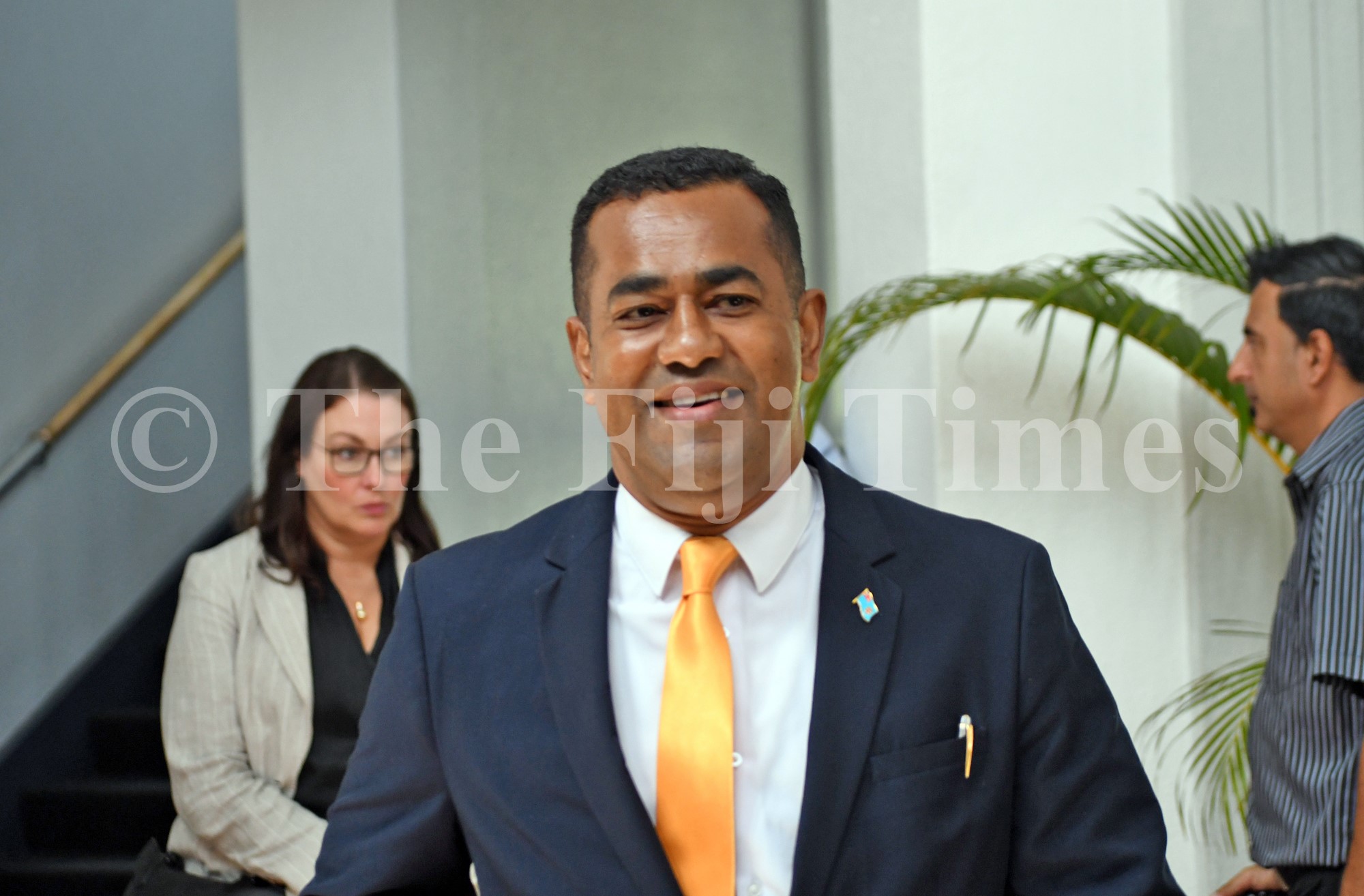After just two years with a whistle, Tiana Ngawati has become the second woman to referee a men’s NPC rugby match. She tells Merryn Anderson why she didn’t give the players an inch.
With the no-nonsense way Tiana Ngawati held a yellow card up to Northland’s towering prop Leka Tu’ungafasi and sent him from the McLean Park field, she must have the most well-behaved kids in the classroom.
As one of the few female referees working at the highest level of rugby in New Zealand, Ngawati controls the game with authority and assertiveness. Off the field, the bubbly, friendly former Black Ferns Sevens player also balances her life with being a teacher and a mum to daughter, Carol-Marie.
A teacher at Te Wharekura O Mauao, a full immersion te reo Māori school for students from years 7-13, Ngawati has learned to back herself in the classroom and on the rugby field.
“You’ve got to have that clear boundary of what’s okay and what’s not,” Ngawati says of the similarities between her two jobs.
“I guess my teaching’s got better since being a referee as well, because with the kids, you can sort of give a bit of leeway and leniency and have a bit of grace. But with players, especially adults, you give them too much room and they’ll just take a mile, you know?”
That’s why she had no hesitation sending Tu’ungafasi to the sinbin, citing a dangerous tackle, in Saturday’s Bunnings NPC game between Northland and Hawke’s Bay in Napier.
“It had to be done,” she says matter-of-factly.
It was Ngawati’s first game at the first-class level of men’s rugby – and she became only the second woman to achieve that feat.
She follows in the footsteps of Rebecca Mahoney, the first woman to referee a match in New Zealand’s premier domestic rugby competition. Mahoney refereed a match between Hawke’s Bay and Southland in 2019 and a Ranfurly Shield challenge, before retiring from first-class refereeing earlier this year.
Ngawati certainly felt the lift in intensity in Saturday’s match (which the Magpies won, 25-16), and noticed a lot more speed in the game and the ball. She felt proud, she says, and after analysing her performance, was confident she made the right choices.
Making the switch from netball to rugby when she was 15, Ngawati’s playing career spanned more than a decade. A stalwart of the College Rifles club, she made 17 appearances for the Auckland Storm in the Farah Palmer Cup through till the end of 2017. She also had a stint in the Black Ferns Sevens.
“It wasn’t until I moved to Tauranga that I decided to pick up refereeing as a way of keeping in the game and giving back to the game – as well as just adapting my new routine as being a mum and getting to know people in a new city,” says Ngawati, who is of Ngāti Hine, Ngāti Porou and Ngāti Whakaue descent.
She hadn’t expected to referee at NPC level after just two seasons controlling games. This season, she had refereed in the women’s FPC – including the final – and the Heartland men’s competition, but the call from New Zealand Rugby’s national referee manager, Bryce Lawrence, inviting her to control the Northland v Hawkes Bay clash came out of the blue.
Ngawati credits female referees across the world, such as Sara Cox, Hollie Davidson and Amy Perrett, for increasing the profile of women’s refereeing worldwide and contributing to the visibility of women in refereeing. She calls them ‘trailblazers’.
When asked if she had ever experienced any sexism while on the job, Ngawati’s answer is an emphatic ‘no’.
“If you get to a certain level, it’s the same as a male ref. You’ve got through all the law exams, you’ve showed your abilities and capabilities to get to that level, so there isn’t any sort of discrimination or difference,” she says. “No matter what gender you are, if you get to a certain level then the players are going to respect you because you’ve earned your way to that level.”
Lawrence backs up Ngawati’s stance.
“We’ve never had issues with female referees in our domestic competitions around the way they’ve been treated by the rugby folks,” he says. “In fact, the provincial unions and the people at games and the old-timers, they absolutely embrace our female referees, so it’s a really positive experience for them.”
Around 70 of the 1800-odd rugby referees in New Zealand are women, and of the 30 named this year’s high performance referee squad, six of those are women.
“We’re massively interested in growing the women’s game – and that’s playing, coaching and refereeing,” says Lawrence.
“We [NZ Rugby] are promoting as many opportunities for those women to referee, both domestically and internationally, in sevens and XVs. At community level, we’re working hard with the provincial unions to create really good club environments that are welcoming and understanding of female referees.”
Ngawati has already seen the impact of her work, recalling times when parents have approached her to say their daughters have been inspired to see a woman take charge of a high-intensity men’s game.
Her advice to any women interested in picking up the whistle is to have courage. “It does take a bit of courage to step into that space, but anyone who has an interest and a passion in it, will just absolutely love it,” she says.
“It is a male-dominated space, but women can do it. And it’s an equal pathway to men. You’ve just got to have that mana about you, to know that you can do it and be graceful and bring an element to the game that will not so much soften it, but bring a balance. Because it’s quite a nice balance when you get to that point.”
Lawrence is full of praise for Ngawati, and how she’s bringing visibility to the hard work of women in rugby refereeing.
“I think the power of what Tiana is doing is that what you see, you can believe,” he says. “We can say in the media ‘look there’s lots of opportunities’ but unless you can actually see it, you might not believe it.
“I think she’s just a wonderful role model for female athletes. She’s a teacher, she’s bright, she’s engaging, she’s fit, she’s got a rugby background, she loves rugby and she just loves the challenge. It’s just awesome that if she’s out there doing the best she can, and really contributing to a game, other young females can see it and dream that they could be there, too.”
As for what’s next for Ngawati, she’s looking to continue on the pathway that she’s on, with a few NPC and Heartland games booked in, and potential sevens games in the near future.
Naturally, it’s her dream to referee at next year’s Women’s Rugby World Cup on New Zealand soil.
Ngawati can rest assured she’s already inspiring a new generation of young women to whistle. Even teenagers are following in her tracks.
“I know there’s a young girl out in Thames who’s just smashing it,” she says. “She’s just so strong, she’s so passionate and brave and like there’s no mucking around with that child whatsoever. And the boys never talk back to her.
“She’s only 16 I think, but she’s going to be amazing. By looking at her on the field, I just know she’s going to do so well.”





